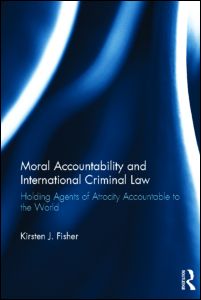How do we hold accountable the agents, individuals and collectives guilty of ordering mass murder? Can individual responsibility ever be determined in the context of collectively perpetrated political crimes? Kirsten J Fisher’s book attempts to answer these questions, in a book that will appeal to students of law and human rights. This book makes a valiant effort to put forward definite conclusions on where international criminal law should head, and what it should be based upon, concludes Kenneth Martin.
 Moral Accountability and International Criminal Law: Holding Agents of Atrocity Accountable to the World. Kirsten J Fisher. Routledge. April 2013.
Moral Accountability and International Criminal Law: Holding Agents of Atrocity Accountable to the World. Kirsten J Fisher. Routledge. April 2013.
This book attempts to straddle a difficult line: discussing, with an explicitly moral or normatively prescriptive perspective, international criminal law’s direction, strengths and weaknesses, all the while with a view to remaining analytically objective. Kirsten J Fisher has taken on an extremely problematic project in trying to advance normative theory to keep in step with international criminal law’s developments, by combining political philosophy and legal thought. International criminal law has indeed advanced by leaps and bounds in recent history, and formal normative theory has struggled to keep up and maintain a coherent structure of thought to effectively underpin this evolution – this book steps into that gap. Moral Accountability provides a well written and clear account of a difficult project, but due to the impossible nature of the problem itself, is not the normative and legal breakthrough that many interested in international criminal law might hope for.
Fisher’s work moves logically from foundational definition work to normative conclusions. She begins by defining the proper realm of ICL and which international crimes should be considered under it. In her view these are the crimes that represent a serious threat to organised political life and violate basic principles of human rights; crimes in the interest of all people to prevent or respond to. She then tackles the more difficult how’s and why’s of ICL in proceeding chapters: how shall ICL be administered, by whom, to whom, and what type of justice are we interested in and for whom? The concluding chapters focus on her own conclusions, her evaluation of ICL currently, and the concept of collective punishment.
One of Moral Accountability‘s great strengths is its tackling of major problems within the literature – Fisher does not ignore thorny normative questions. Individual responsibility in collective crimes, retributive justice as Western culturally defined justice, and how to evaluate local mechanisms of international criminal systems are discussed, with Fisher offering well-reasoned conclusions and recommendations on each. Probably the most interesting (or shocking, from a different point of view) of her overall conclusions on where ICL should go, Fisher puts forward a limited notion of collective punishment as appropriate and necessary for atrocity crimes, as long as the aim is not purely punishment, but the communication of justice across a society. Fisher’s solution to the problem that few are individually criminally responsible for atrocity crimes, but many share moral responsibility through collusion or support, is to identify, expose or barr them from future office (p. 180). This theme of international criminal law as primarily being expressive in nature, rather than focused on retribution or the repair of the offence reoccurs through much of the work. The inherent limitations of ICL for regeneration of a post-conflict society is also highlighted effectively, including an interesting analysis of individualised retributive justice being a primarily Western and thus not fully applicable to many societies.
ICL, in Fisher’s view, exists currently in its incomplete form for historical and political reasons. Her conclusion points to the objections of many major states to many parts of ICL, including the International Criminal Court, and notes that even her limited future goal for ICL – a fully internationalised criminal system administered by regional courts – is impractical at the current time.
One of the strongest points of the book, written in a field where ‘normative’ often simply means moralising in line with the views of the author, is the obvious understanding of Fisher of the political realities of international criminal law. She includes, for example, a clear role for states – often maligned as enemies of ICL in much of the literature – in her ideal international criminal system, while still distinguishing a uniquely defined realm of ICL and international crimes without reference to states’ domestic law systems.
In the final analysis, Moral Accountability makes a valiant effort to put forward definite conclusions on where international criminal law should head, and what it should be based upon. The great strength of this book is its willingness to attack major problems in normative and legal theory head on while still being unafraid to offer a reasonable conclusion. Moral Accountability will appeal to scholars of ICL looking for a comprehensive review and analysis of the relation of normative theory and legal theory to ICL, to practicioners interested in a clearheaded assessment of the field, and the interested public looking for a useful summation of an extremely complicated and contradictory realm of thought and practice. Its best use, however, is to those already familiar with the theoretical, moral and legal issues currently at play in ICL, and who are looking or interested in a new perspective. While the book’s introduction correctly notes that it is written mostly jargon-free and therefore accessible by the non-specialist, much of the debate Fisher engages with is at the cutting edge of the field, and thus to get the most out of Moral Accountability, one should be well read in the subject. The book’s failings – in that no real definite conclusions can be offered, that many of the conclusions, while taking stock of political realities, still fall short of political likelihood, and that no comprehensive normative theory can be offered for why international criminal law should be a desirable goal for humankind – are rooted in the intractability of the subject material itself, rather than a failing of the author.
—————————————————————-
Kenneth Martin is a PhD candidate in the Department of Political Science at Concordia University, in Montreal, Canada, focusing on non-state armed groups, South Asia, and the contestation and construction of the state. He is also a Fellow of the US Army’s Peacekeeping and Stability Operations Institute, and a serving Canadian Forces infantry officer. Read reviews by Kenneth.






